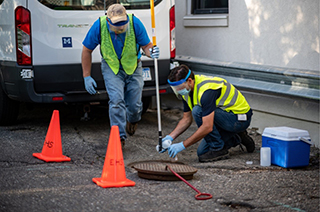July 13, 2021

Philip Szornyi and Anthony Shourds collect sewage samples behind University of Michigan’s Campus Safety Services building in August, before students move-in started on Aug. 24.
(Photo courtesy of Eric Bronson, Michigan Photography)
As COVID-19 spreads, multiple NIEHS-supported researchers have been tracking and mitigating infections using wastewater-based epidemiology. NIEHS-funded researchers are using this methodology to trace and reduce COVID-19 exposures on campuses, nursing homes, and rural areas.
As COVID-19 vaccine distribution accelerates and COVID-19 testing slows, wastewater analysis and tracking could play a role in modelling the spread of COVID-19. Additionally, this research could lead to statewide early warning systems that can inform public communications, individual behaviors, population testing, and public health policy decisions to reduce risks from COVID-19 or other diseases.
The projects highlighted below are conducted by NIEHS grantees seeking to address COVID-19 concerns.
Nadine Kotlarz, Ph.D., leveraged expertise on statistical analysis and science communication through the NIEHS-funded Center for Human Health and the Environment at North Carolina State University. Kotlarz and her team of researchers measured COVID-19 RNA concentrations in wastewater solids from the Raleigh wastewater treatment plant that serves approximately 500,00 people. Although the virus that causes COVID-19 quickly becomes non-infectious in wastewater, small pieces of RNA is identified, tracked, and traced for several days. In all analyzed samples, remnants of COVID-19 RNA were detected and correlated positively and significantly with laboratory confirmed cases of COVID-19 in the community, strongly suggesting that wastewater surveillance can be used to track COVID-19 infection trends as the community level.
Delving deeper, James Keck, M.D., and colleagues have developed a novel assay for COVID-19 in wastewater. Their pilot project, supported by the University of Kentucky Center for Appalachian Research in Environmental Sciences (UK-CARES), showed that magnetic bead technology developed by Scott Berry, Ph.D., was sensitive and efficient in extracting COVID-19 RNA from wastewater. Keck’s team has been using this technology in an NIH RADx-rad funded project, which is developing mobile point-of-wastewater sample acquisition testing technology for use in rural Kentucky in hopes to make wastewater surveillance of COVID-19 less time and resource intensive which would increase the chances for wide-scale application, especially in rural communities.
Preventing disease in rapid-spread environments, such as campuses and nursing homes, has been an area of great concern throughout the United States. Considering these concerns on their own campus, Chuanwu Xi, Ph.D., and his research team from the University of Michigan School of Public Health have monitored the viral load of sewage samples on campus to collect data on the correlation of positive cases of COVID-19 and wastewater samples, with support from the NIEHS-funded M-LEEaD Center. They used the collected data to predict environmental exposure risks and model the spread of COVID-19 in dormitories. Furthermore, they are using wastewater-based epidemiology to evaluate the efficacy of triggered interventions of potentially infected students in reducing COVID-19 infections. Xi says that the goal of the project is to assess and improve the robustness of using wastewater-based epidemiology to signal early warnings of an outbreak in campus buildings and, in conjunction with early interventions, to reduce the spread of the virus in the campus community.
Other college campuses have seen success with triggered interventions based on wastewater-based epidemiology data. The University of Arizona recently announced that testing wastewater from dorms led them to identify and isolate two asymptomatic students before they could infect others. This type of data is invaluable in rapid-spread environments and will continue to be a useful tool to monitor asymptomatic and breakthrough infections.
These projects indicate wastewater-based epidemiology can be used not only to better our public health, but also serve as an important modelling tool for infectious diseases. If applied socially, this research could culminate as a potential “early-warning tool” for states and counties to track COVID-19 and other infectious diseases.
In a April 2021 publication, Katrina Korfmacher, Ph.D, of the University of Rochester Environmental Agents as Modulators of Disease Processes Center, and co-authors synthesize initial wastewater surveillance efforts at 25 colleges and universities from across the country. The authors present a framework based on the case studies that could enable other colleges to plan, implement, and evaluate their own wastewater surveillance systems. This approach may be useful for long-term sustained monitoring of COVID-19 and other future diseases.


